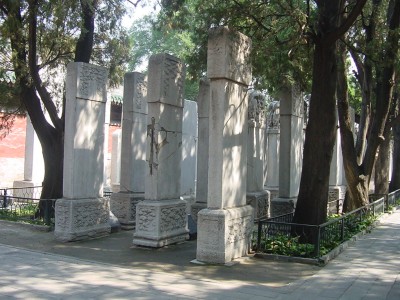
allow this hardship to alter his views, however. His teaching went on, and it was at this stage of his life that his sayings began to be recorded by his disciples. Confucius' legacy to the future would be preserved by those around him. In 479 BCE, he passed away. He was buried by his faithful disciples in Qufu, where today people can see the spectacular K'ung Forest, spanning eight kilometres in perimeter, started by just a few trees planted by the disciples all that time ago. In the forest planted in memory of Confucius, there is an analogy to be drawn regarding his teachings themselves. In the Classical Age, Confucianism was to flourish, and go on to become one of China's definitive philosophies. In terms of praise to the philosophy's founder, however, time would have to pass before this moment. In 140 BCE, Confucianism was proclaimed the one true school of thought; in 5 CE Emperor P'ing of the Han Dynasty granted Confucius posthumous honour by Imperial Command, calling him "revered and accomplished". By 739 CE, Emperor Hsüan of the T'ang Dynasty described Confucius as "royal" and praised him for his literary supremacy. The ultimate pronouncement of Confucius' gift to China and the world was to come from Emperor K'ang Hsi of the Qing Dynasty, who bestowed upon him the title of "Grand Master of All Ages." If there was one man who could be cited as having had the most effect on Chinese culture, society,religion, politics and mindset, that man would have to Confucius - and as such, the titles he was given, albeit after his death, seem wholly right and proper.
